Management Behaviour, Leadership, and Teamwork Theories Report
VerifiedAdded on 2023/01/11
|9
|2695
|52
Report
AI Summary
This report delves into the key aspects of management and organisational behaviour, specifically within the context of the Grosvenor Hotel in Torquay. It explores various models of management behaviour, including the supportive and system models, and examines different leadership models such as coaching and situational leadership. The report also analyses teamworking theories, with a particular focus on Tuckman's team development theory, highlighting its stages of forming, storming, norming, performing, and adjourning, and how they can be applied to improve people management skills. The content provides valuable insights for the hotel's general manager, Mark Jenkins, to enhance his performance and the overall effectiveness of the hotel's operations by fostering a productive work environment and improving employee relations.
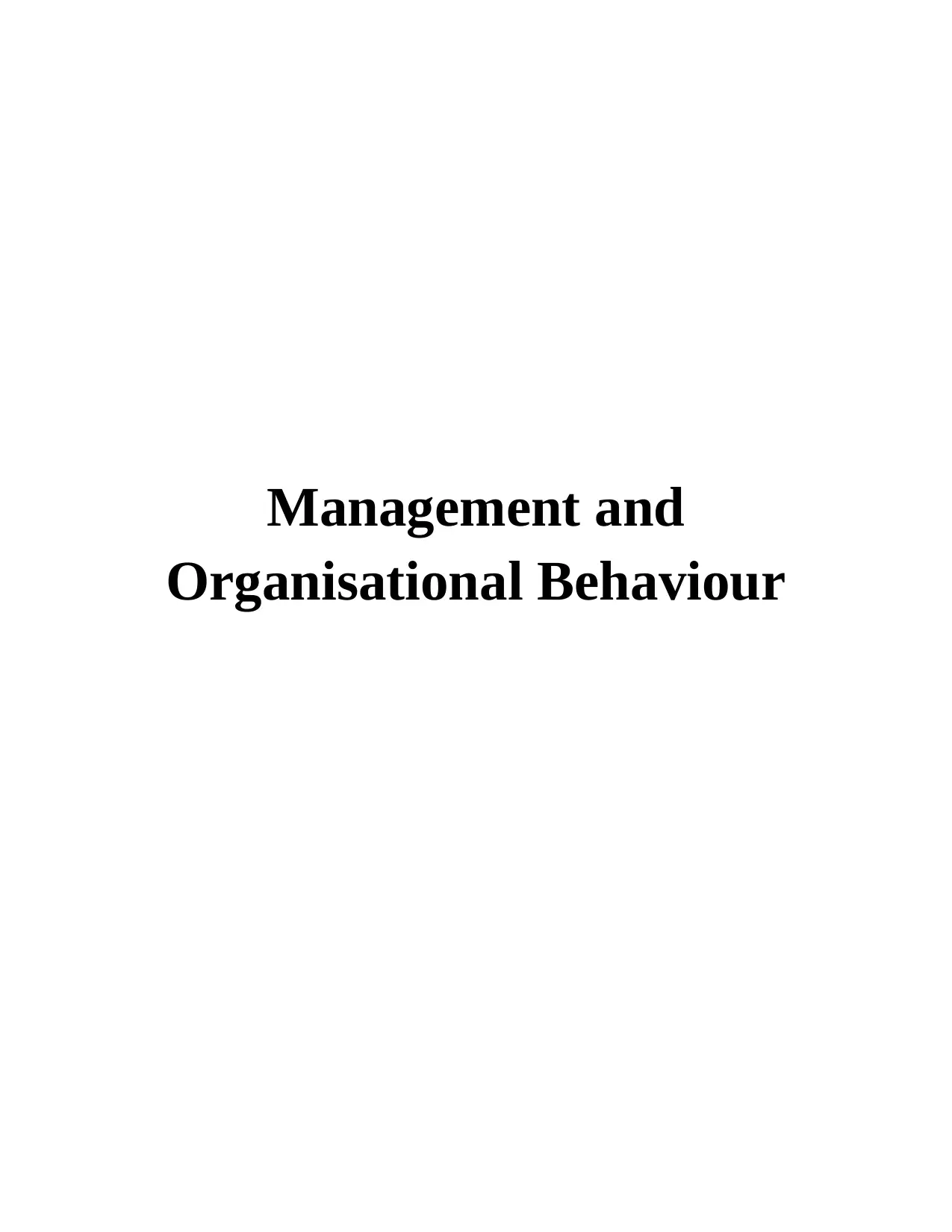
Management and
Organisational Behaviour
Organisational Behaviour
Paraphrase This Document
Need a fresh take? Get an instant paraphrase of this document with our AI Paraphraser
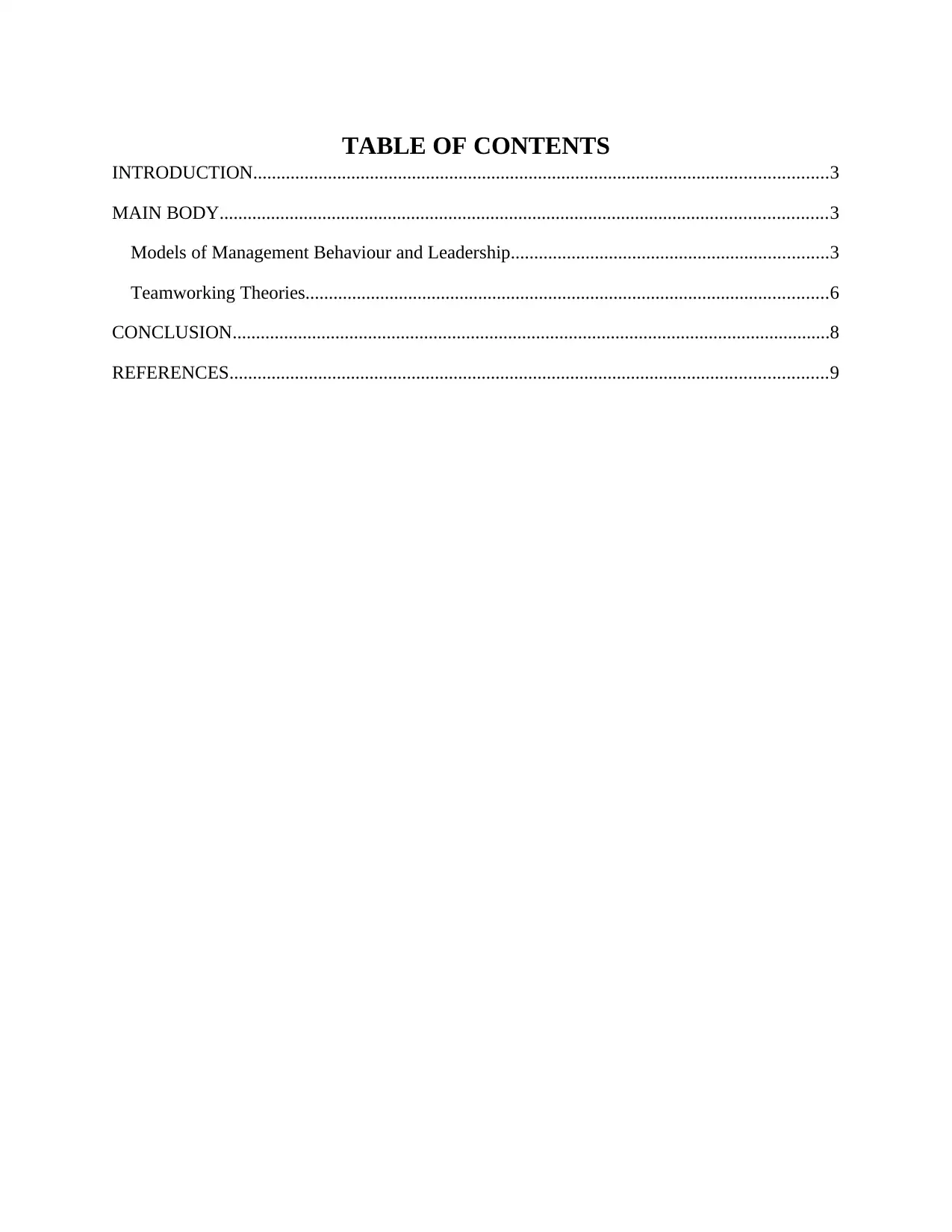
TABLE OF CONTENTS
INTRODUCTION...........................................................................................................................3
MAIN BODY..................................................................................................................................3
Models of Management Behaviour and Leadership....................................................................3
Teamworking Theories................................................................................................................6
CONCLUSION................................................................................................................................8
REFERENCES................................................................................................................................9
INTRODUCTION...........................................................................................................................3
MAIN BODY..................................................................................................................................3
Models of Management Behaviour and Leadership....................................................................3
Teamworking Theories................................................................................................................6
CONCLUSION................................................................................................................................8
REFERENCES................................................................................................................................9
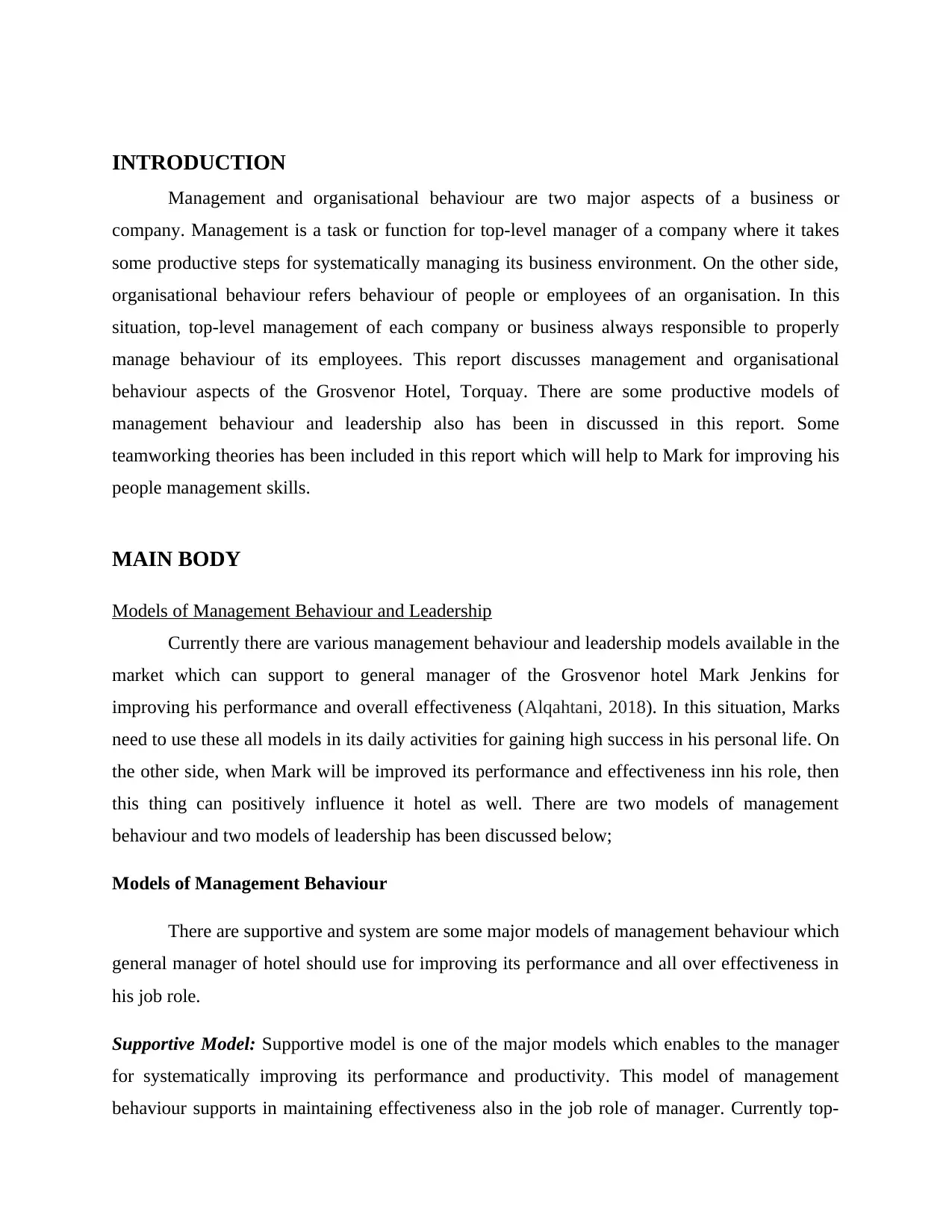
INTRODUCTION
Management and organisational behaviour are two major aspects of a business or
company. Management is a task or function for top-level manager of a company where it takes
some productive steps for systematically managing its business environment. On the other side,
organisational behaviour refers behaviour of people or employees of an organisation. In this
situation, top-level management of each company or business always responsible to properly
manage behaviour of its employees. This report discusses management and organisational
behaviour aspects of the Grosvenor Hotel, Torquay. There are some productive models of
management behaviour and leadership also has been in discussed in this report. Some
teamworking theories has been included in this report which will help to Mark for improving his
people management skills.
MAIN BODY
Models of Management Behaviour and Leadership
Currently there are various management behaviour and leadership models available in the
market which can support to general manager of the Grosvenor hotel Mark Jenkins for
improving his performance and overall effectiveness (Alqahtani, 2018). In this situation, Marks
need to use these all models in its daily activities for gaining high success in his personal life. On
the other side, when Mark will be improved its performance and effectiveness inn his role, then
this thing can positively influence it hotel as well. There are two models of management
behaviour and two models of leadership has been discussed below;
Models of Management Behaviour
There are supportive and system are some major models of management behaviour which
general manager of hotel should use for improving its performance and all over effectiveness in
his job role.
Supportive Model: Supportive model is one of the major models which enables to the manager
for systematically improving its performance and productivity. This model of management
behaviour supports in maintaining effectiveness also in the job role of manager. Currently top-
Management and organisational behaviour are two major aspects of a business or
company. Management is a task or function for top-level manager of a company where it takes
some productive steps for systematically managing its business environment. On the other side,
organisational behaviour refers behaviour of people or employees of an organisation. In this
situation, top-level management of each company or business always responsible to properly
manage behaviour of its employees. This report discusses management and organisational
behaviour aspects of the Grosvenor Hotel, Torquay. There are some productive models of
management behaviour and leadership also has been in discussed in this report. Some
teamworking theories has been included in this report which will help to Mark for improving his
people management skills.
MAIN BODY
Models of Management Behaviour and Leadership
Currently there are various management behaviour and leadership models available in the
market which can support to general manager of the Grosvenor hotel Mark Jenkins for
improving his performance and overall effectiveness (Alqahtani, 2018). In this situation, Marks
need to use these all models in its daily activities for gaining high success in his personal life. On
the other side, when Mark will be improved its performance and effectiveness inn his role, then
this thing can positively influence it hotel as well. There are two models of management
behaviour and two models of leadership has been discussed below;
Models of Management Behaviour
There are supportive and system are some major models of management behaviour which
general manager of hotel should use for improving its performance and all over effectiveness in
his job role.
Supportive Model: Supportive model is one of the major models which enables to the manager
for systematically improving its performance and productivity. This model of management
behaviour supports in maintaining effectiveness also in the job role of manager. Currently top-
⊘ This is a preview!⊘
Do you want full access?
Subscribe today to unlock all pages.

Trusted by 1+ million students worldwide
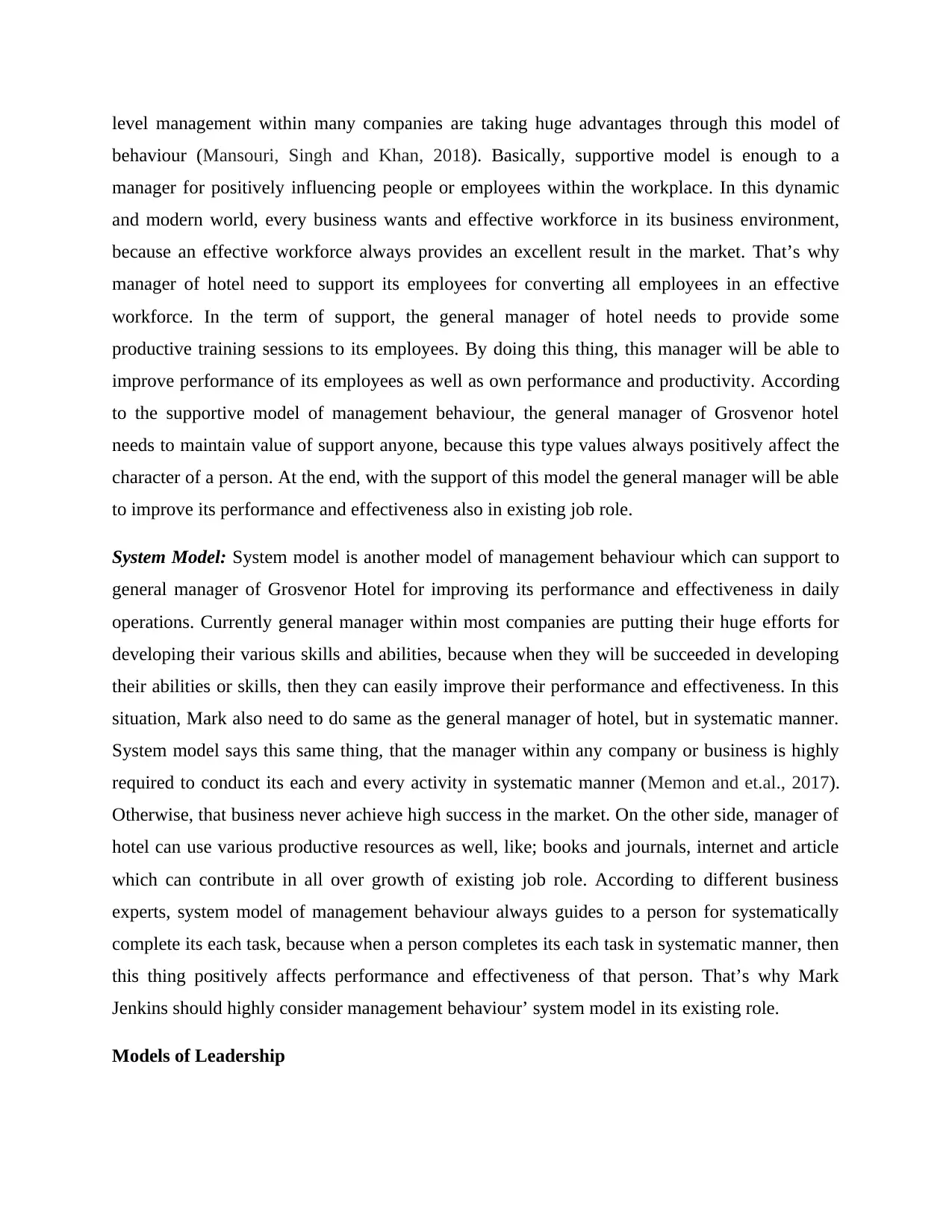
level management within many companies are taking huge advantages through this model of
behaviour (Mansouri, Singh and Khan, 2018). Basically, supportive model is enough to a
manager for positively influencing people or employees within the workplace. In this dynamic
and modern world, every business wants and effective workforce in its business environment,
because an effective workforce always provides an excellent result in the market. That’s why
manager of hotel need to support its employees for converting all employees in an effective
workforce. In the term of support, the general manager of hotel needs to provide some
productive training sessions to its employees. By doing this thing, this manager will be able to
improve performance of its employees as well as own performance and productivity. According
to the supportive model of management behaviour, the general manager of Grosvenor hotel
needs to maintain value of support anyone, because this type values always positively affect the
character of a person. At the end, with the support of this model the general manager will be able
to improve its performance and effectiveness also in existing job role.
System Model: System model is another model of management behaviour which can support to
general manager of Grosvenor Hotel for improving its performance and effectiveness in daily
operations. Currently general manager within most companies are putting their huge efforts for
developing their various skills and abilities, because when they will be succeeded in developing
their abilities or skills, then they can easily improve their performance and effectiveness. In this
situation, Mark also need to do same as the general manager of hotel, but in systematic manner.
System model says this same thing, that the manager within any company or business is highly
required to conduct its each and every activity in systematic manner (Memon and et.al., 2017).
Otherwise, that business never achieve high success in the market. On the other side, manager of
hotel can use various productive resources as well, like; books and journals, internet and article
which can contribute in all over growth of existing job role. According to different business
experts, system model of management behaviour always guides to a person for systematically
complete its each task, because when a person completes its each task in systematic manner, then
this thing positively affects performance and effectiveness of that person. That’s why Mark
Jenkins should highly consider management behaviour’ system model in its existing role.
Models of Leadership
behaviour (Mansouri, Singh and Khan, 2018). Basically, supportive model is enough to a
manager for positively influencing people or employees within the workplace. In this dynamic
and modern world, every business wants and effective workforce in its business environment,
because an effective workforce always provides an excellent result in the market. That’s why
manager of hotel need to support its employees for converting all employees in an effective
workforce. In the term of support, the general manager of hotel needs to provide some
productive training sessions to its employees. By doing this thing, this manager will be able to
improve performance of its employees as well as own performance and productivity. According
to the supportive model of management behaviour, the general manager of Grosvenor hotel
needs to maintain value of support anyone, because this type values always positively affect the
character of a person. At the end, with the support of this model the general manager will be able
to improve its performance and effectiveness also in existing job role.
System Model: System model is another model of management behaviour which can support to
general manager of Grosvenor Hotel for improving its performance and effectiveness in daily
operations. Currently general manager within most companies are putting their huge efforts for
developing their various skills and abilities, because when they will be succeeded in developing
their abilities or skills, then they can easily improve their performance and effectiveness. In this
situation, Mark also need to do same as the general manager of hotel, but in systematic manner.
System model says this same thing, that the manager within any company or business is highly
required to conduct its each and every activity in systematic manner (Memon and et.al., 2017).
Otherwise, that business never achieve high success in the market. On the other side, manager of
hotel can use various productive resources as well, like; books and journals, internet and article
which can contribute in all over growth of existing job role. According to different business
experts, system model of management behaviour always guides to a person for systematically
complete its each task, because when a person completes its each task in systematic manner, then
this thing positively affects performance and effectiveness of that person. That’s why Mark
Jenkins should highly consider management behaviour’ system model in its existing role.
Models of Leadership
Paraphrase This Document
Need a fresh take? Get an instant paraphrase of this document with our AI Paraphraser
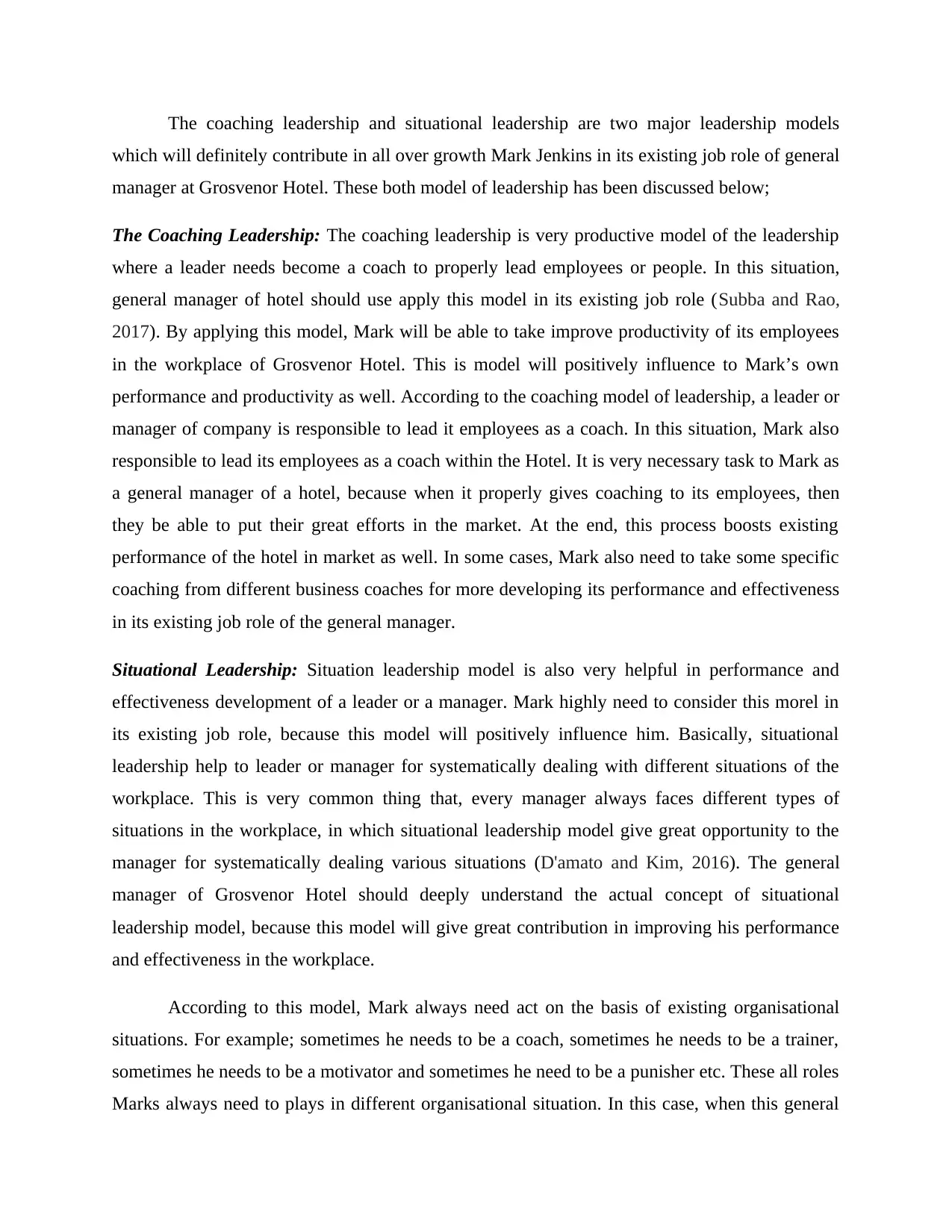
The coaching leadership and situational leadership are two major leadership models
which will definitely contribute in all over growth Mark Jenkins in its existing job role of general
manager at Grosvenor Hotel. These both model of leadership has been discussed below;
The Coaching Leadership: The coaching leadership is very productive model of the leadership
where a leader needs become a coach to properly lead employees or people. In this situation,
general manager of hotel should use apply this model in its existing job role (Subba and Rao,
2017). By applying this model, Mark will be able to take improve productivity of its employees
in the workplace of Grosvenor Hotel. This is model will positively influence to Mark’s own
performance and productivity as well. According to the coaching model of leadership, a leader or
manager of company is responsible to lead it employees as a coach. In this situation, Mark also
responsible to lead its employees as a coach within the Hotel. It is very necessary task to Mark as
a general manager of a hotel, because when it properly gives coaching to its employees, then
they be able to put their great efforts in the market. At the end, this process boosts existing
performance of the hotel in market as well. In some cases, Mark also need to take some specific
coaching from different business coaches for more developing its performance and effectiveness
in its existing job role of the general manager.
Situational Leadership: Situation leadership model is also very helpful in performance and
effectiveness development of a leader or a manager. Mark highly need to consider this morel in
its existing job role, because this model will positively influence him. Basically, situational
leadership help to leader or manager for systematically dealing with different situations of the
workplace. This is very common thing that, every manager always faces different types of
situations in the workplace, in which situational leadership model give great opportunity to the
manager for systematically dealing various situations (D'amato and Kim, 2016). The general
manager of Grosvenor Hotel should deeply understand the actual concept of situational
leadership model, because this model will give great contribution in improving his performance
and effectiveness in the workplace.
According to this model, Mark always need act on the basis of existing organisational
situations. For example; sometimes he needs to be a coach, sometimes he needs to be a trainer,
sometimes he needs to be a motivator and sometimes he need to be a punisher etc. These all roles
Marks always need to plays in different organisational situation. In this case, when this general
which will definitely contribute in all over growth Mark Jenkins in its existing job role of general
manager at Grosvenor Hotel. These both model of leadership has been discussed below;
The Coaching Leadership: The coaching leadership is very productive model of the leadership
where a leader needs become a coach to properly lead employees or people. In this situation,
general manager of hotel should use apply this model in its existing job role (Subba and Rao,
2017). By applying this model, Mark will be able to take improve productivity of its employees
in the workplace of Grosvenor Hotel. This is model will positively influence to Mark’s own
performance and productivity as well. According to the coaching model of leadership, a leader or
manager of company is responsible to lead it employees as a coach. In this situation, Mark also
responsible to lead its employees as a coach within the Hotel. It is very necessary task to Mark as
a general manager of a hotel, because when it properly gives coaching to its employees, then
they be able to put their great efforts in the market. At the end, this process boosts existing
performance of the hotel in market as well. In some cases, Mark also need to take some specific
coaching from different business coaches for more developing its performance and effectiveness
in its existing job role of the general manager.
Situational Leadership: Situation leadership model is also very helpful in performance and
effectiveness development of a leader or a manager. Mark highly need to consider this morel in
its existing job role, because this model will positively influence him. Basically, situational
leadership help to leader or manager for systematically dealing with different situations of the
workplace. This is very common thing that, every manager always faces different types of
situations in the workplace, in which situational leadership model give great opportunity to the
manager for systematically dealing various situations (D'amato and Kim, 2016). The general
manager of Grosvenor Hotel should deeply understand the actual concept of situational
leadership model, because this model will give great contribution in improving his performance
and effectiveness in the workplace.
According to this model, Mark always need act on the basis of existing organisational
situations. For example; sometimes he needs to be a coach, sometimes he needs to be a trainer,
sometimes he needs to be a motivator and sometimes he need to be a punisher etc. These all roles
Marks always need to plays in different organisational situation. In this case, when this general
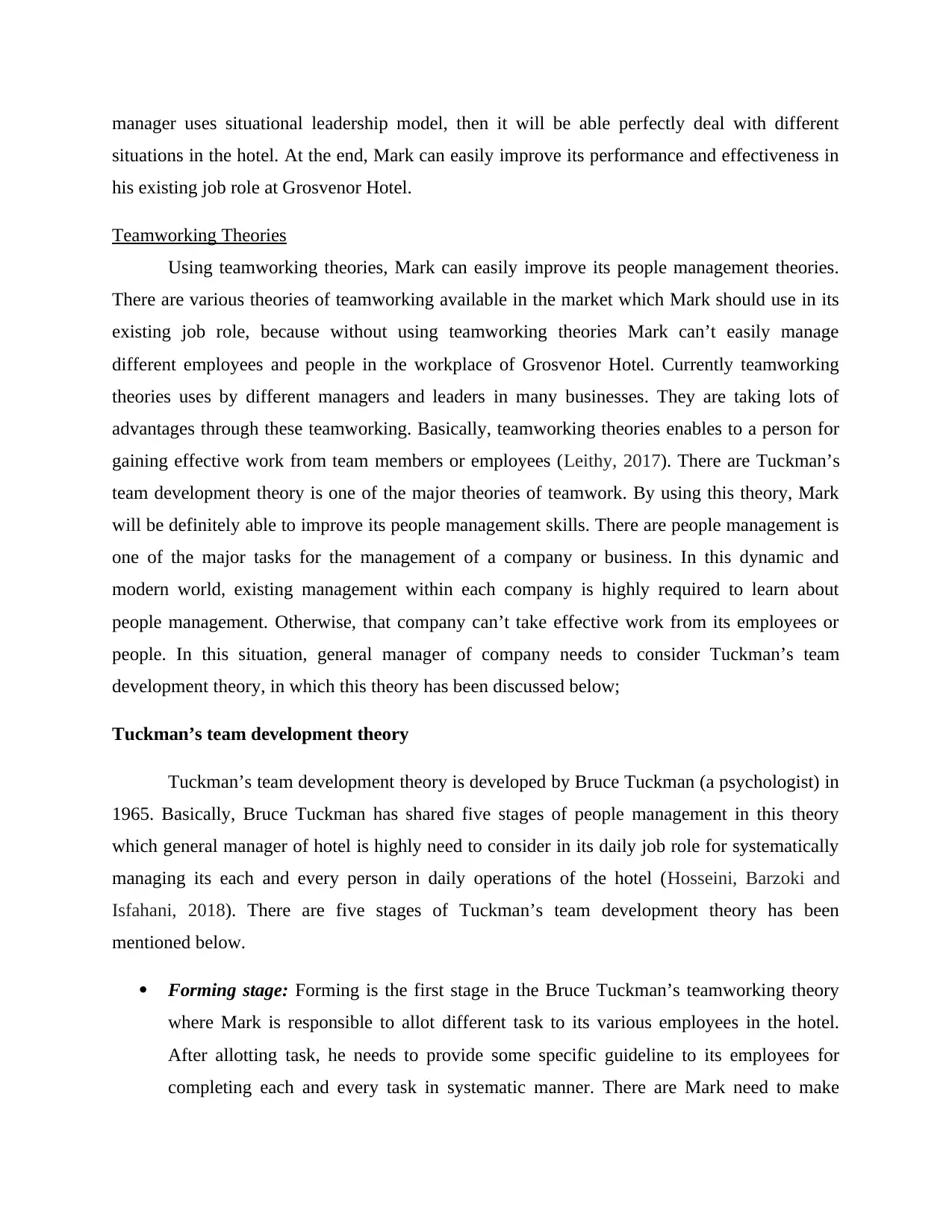
manager uses situational leadership model, then it will be able perfectly deal with different
situations in the hotel. At the end, Mark can easily improve its performance and effectiveness in
his existing job role at Grosvenor Hotel.
Teamworking Theories
Using teamworking theories, Mark can easily improve its people management theories.
There are various theories of teamworking available in the market which Mark should use in its
existing job role, because without using teamworking theories Mark can’t easily manage
different employees and people in the workplace of Grosvenor Hotel. Currently teamworking
theories uses by different managers and leaders in many businesses. They are taking lots of
advantages through these teamworking. Basically, teamworking theories enables to a person for
gaining effective work from team members or employees (Leithy, 2017). There are Tuckman’s
team development theory is one of the major theories of teamwork. By using this theory, Mark
will be definitely able to improve its people management skills. There are people management is
one of the major tasks for the management of a company or business. In this dynamic and
modern world, existing management within each company is highly required to learn about
people management. Otherwise, that company can’t take effective work from its employees or
people. In this situation, general manager of company needs to consider Tuckman’s team
development theory, in which this theory has been discussed below;
Tuckman’s team development theory
Tuckman’s team development theory is developed by Bruce Tuckman (a psychologist) in
1965. Basically, Bruce Tuckman has shared five stages of people management in this theory
which general manager of hotel is highly need to consider in its daily job role for systematically
managing its each and every person in daily operations of the hotel (Hosseini, Barzoki and
Isfahani, 2018). There are five stages of Tuckman’s team development theory has been
mentioned below.
Forming stage: Forming is the first stage in the Bruce Tuckman’s teamworking theory
where Mark is responsible to allot different task to its various employees in the hotel.
After allotting task, he needs to provide some specific guideline to its employees for
completing each and every task in systematic manner. There are Mark need to make
situations in the hotel. At the end, Mark can easily improve its performance and effectiveness in
his existing job role at Grosvenor Hotel.
Teamworking Theories
Using teamworking theories, Mark can easily improve its people management theories.
There are various theories of teamworking available in the market which Mark should use in its
existing job role, because without using teamworking theories Mark can’t easily manage
different employees and people in the workplace of Grosvenor Hotel. Currently teamworking
theories uses by different managers and leaders in many businesses. They are taking lots of
advantages through these teamworking. Basically, teamworking theories enables to a person for
gaining effective work from team members or employees (Leithy, 2017). There are Tuckman’s
team development theory is one of the major theories of teamwork. By using this theory, Mark
will be definitely able to improve its people management skills. There are people management is
one of the major tasks for the management of a company or business. In this dynamic and
modern world, existing management within each company is highly required to learn about
people management. Otherwise, that company can’t take effective work from its employees or
people. In this situation, general manager of company needs to consider Tuckman’s team
development theory, in which this theory has been discussed below;
Tuckman’s team development theory
Tuckman’s team development theory is developed by Bruce Tuckman (a psychologist) in
1965. Basically, Bruce Tuckman has shared five stages of people management in this theory
which general manager of hotel is highly need to consider in its daily job role for systematically
managing its each and every person in daily operations of the hotel (Hosseini, Barzoki and
Isfahani, 2018). There are five stages of Tuckman’s team development theory has been
mentioned below.
Forming stage: Forming is the first stage in the Bruce Tuckman’s teamworking theory
where Mark is responsible to allot different task to its various employees in the hotel.
After allotting task, he needs to provide some specific guideline to its employees for
completing each and every task in systematic manner. There are Mark need to make
⊘ This is a preview!⊘
Do you want full access?
Subscribe today to unlock all pages.

Trusted by 1+ million students worldwide
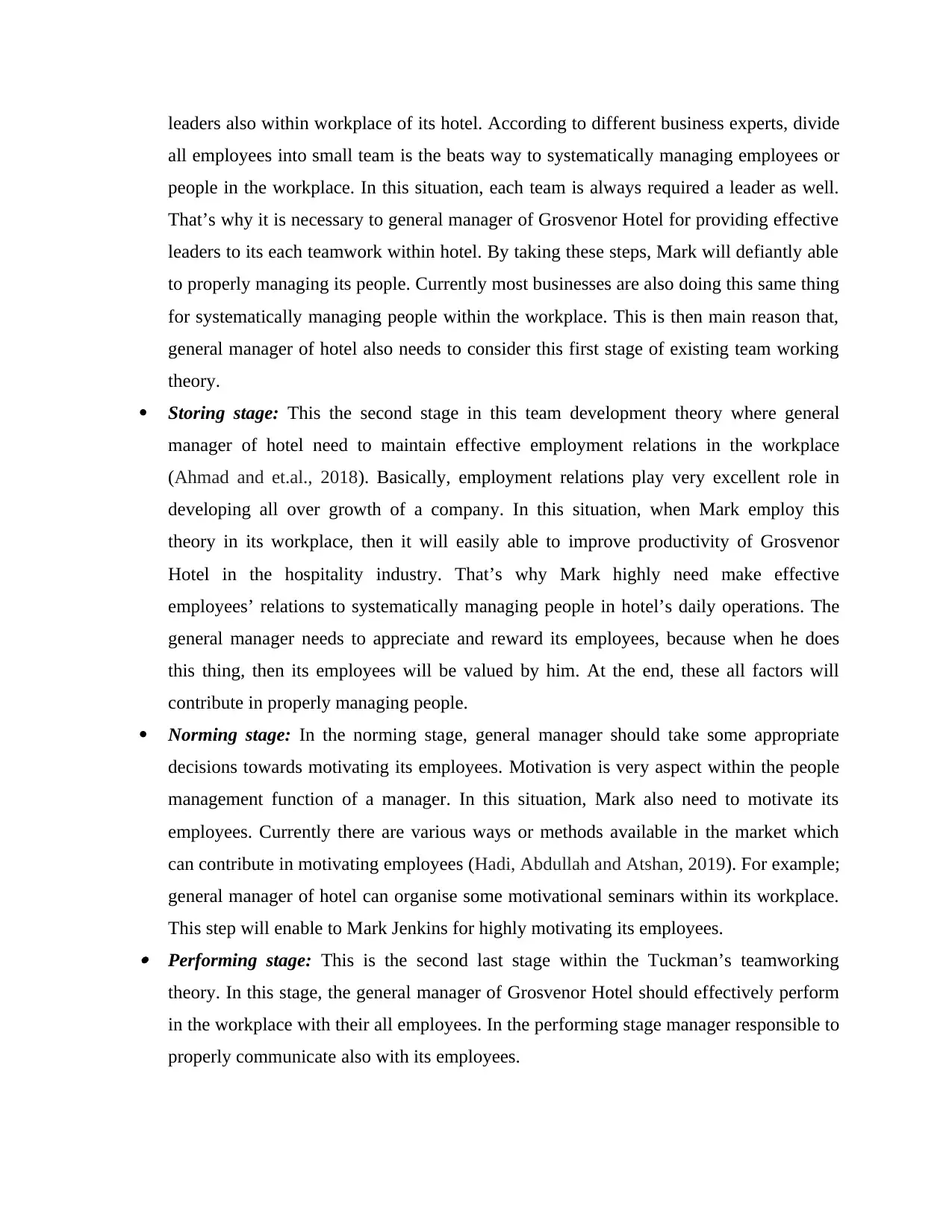
leaders also within workplace of its hotel. According to different business experts, divide
all employees into small team is the beats way to systematically managing employees or
people in the workplace. In this situation, each team is always required a leader as well.
That’s why it is necessary to general manager of Grosvenor Hotel for providing effective
leaders to its each teamwork within hotel. By taking these steps, Mark will defiantly able
to properly managing its people. Currently most businesses are also doing this same thing
for systematically managing people within the workplace. This is then main reason that,
general manager of hotel also needs to consider this first stage of existing team working
theory.
Storing stage: This the second stage in this team development theory where general
manager of hotel need to maintain effective employment relations in the workplace
(Ahmad and et.al., 2018). Basically, employment relations play very excellent role in
developing all over growth of a company. In this situation, when Mark employ this
theory in its workplace, then it will easily able to improve productivity of Grosvenor
Hotel in the hospitality industry. That’s why Mark highly need make effective
employees’ relations to systematically managing people in hotel’s daily operations. The
general manager needs to appreciate and reward its employees, because when he does
this thing, then its employees will be valued by him. At the end, these all factors will
contribute in properly managing people.
Norming stage: In the norming stage, general manager should take some appropriate
decisions towards motivating its employees. Motivation is very aspect within the people
management function of a manager. In this situation, Mark also need to motivate its
employees. Currently there are various ways or methods available in the market which
can contribute in motivating employees (Hadi, Abdullah and Atshan, 2019). For example;
general manager of hotel can organise some motivational seminars within its workplace.
This step will enable to Mark Jenkins for highly motivating its employees. Performing stage: This is the second last stage within the Tuckman’s teamworking
theory. In this stage, the general manager of Grosvenor Hotel should effectively perform
in the workplace with their all employees. In the performing stage manager responsible to
properly communicate also with its employees.
all employees into small team is the beats way to systematically managing employees or
people in the workplace. In this situation, each team is always required a leader as well.
That’s why it is necessary to general manager of Grosvenor Hotel for providing effective
leaders to its each teamwork within hotel. By taking these steps, Mark will defiantly able
to properly managing its people. Currently most businesses are also doing this same thing
for systematically managing people within the workplace. This is then main reason that,
general manager of hotel also needs to consider this first stage of existing team working
theory.
Storing stage: This the second stage in this team development theory where general
manager of hotel need to maintain effective employment relations in the workplace
(Ahmad and et.al., 2018). Basically, employment relations play very excellent role in
developing all over growth of a company. In this situation, when Mark employ this
theory in its workplace, then it will easily able to improve productivity of Grosvenor
Hotel in the hospitality industry. That’s why Mark highly need make effective
employees’ relations to systematically managing people in hotel’s daily operations. The
general manager needs to appreciate and reward its employees, because when he does
this thing, then its employees will be valued by him. At the end, these all factors will
contribute in properly managing people.
Norming stage: In the norming stage, general manager should take some appropriate
decisions towards motivating its employees. Motivation is very aspect within the people
management function of a manager. In this situation, Mark also need to motivate its
employees. Currently there are various ways or methods available in the market which
can contribute in motivating employees (Hadi, Abdullah and Atshan, 2019). For example;
general manager of hotel can organise some motivational seminars within its workplace.
This step will enable to Mark Jenkins for highly motivating its employees. Performing stage: This is the second last stage within the Tuckman’s teamworking
theory. In this stage, the general manager of Grosvenor Hotel should effectively perform
in the workplace with their all employees. In the performing stage manager responsible to
properly communicate also with its employees.
Paraphrase This Document
Need a fresh take? Get an instant paraphrase of this document with our AI Paraphraser
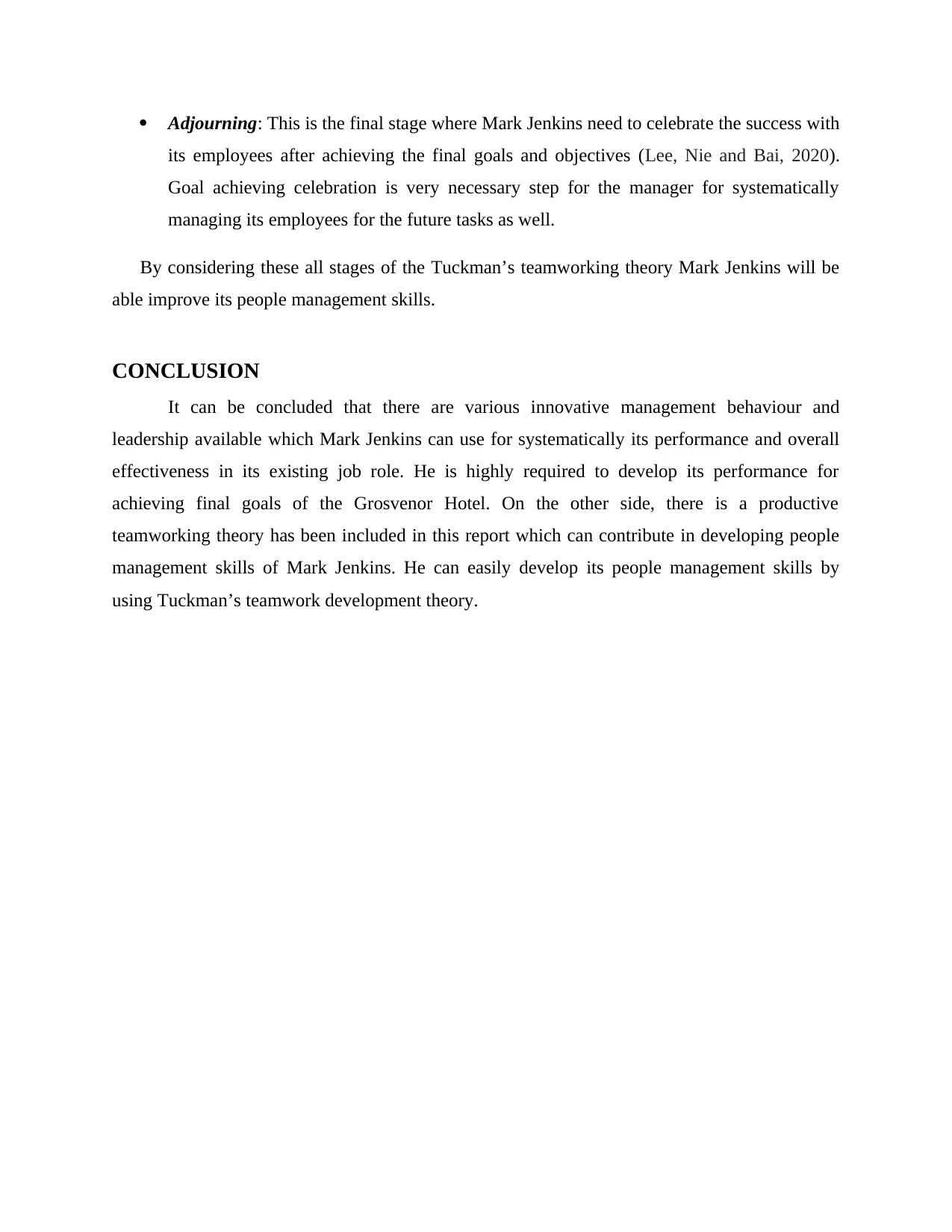
Adjourning: This is the final stage where Mark Jenkins need to celebrate the success with
its employees after achieving the final goals and objectives (Lee, Nie and Bai, 2020).
Goal achieving celebration is very necessary step for the manager for systematically
managing its employees for the future tasks as well.
By considering these all stages of the Tuckman’s teamworking theory Mark Jenkins will be
able improve its people management skills.
CONCLUSION
It can be concluded that there are various innovative management behaviour and
leadership available which Mark Jenkins can use for systematically its performance and overall
effectiveness in its existing job role. He is highly required to develop its performance for
achieving final goals of the Grosvenor Hotel. On the other side, there is a productive
teamworking theory has been included in this report which can contribute in developing people
management skills of Mark Jenkins. He can easily develop its people management skills by
using Tuckman’s teamwork development theory.
its employees after achieving the final goals and objectives (Lee, Nie and Bai, 2020).
Goal achieving celebration is very necessary step for the manager for systematically
managing its employees for the future tasks as well.
By considering these all stages of the Tuckman’s teamworking theory Mark Jenkins will be
able improve its people management skills.
CONCLUSION
It can be concluded that there are various innovative management behaviour and
leadership available which Mark Jenkins can use for systematically its performance and overall
effectiveness in its existing job role. He is highly required to develop its performance for
achieving final goals of the Grosvenor Hotel. On the other side, there is a productive
teamworking theory has been included in this report which can contribute in developing people
management skills of Mark Jenkins. He can easily develop its people management skills by
using Tuckman’s teamwork development theory.
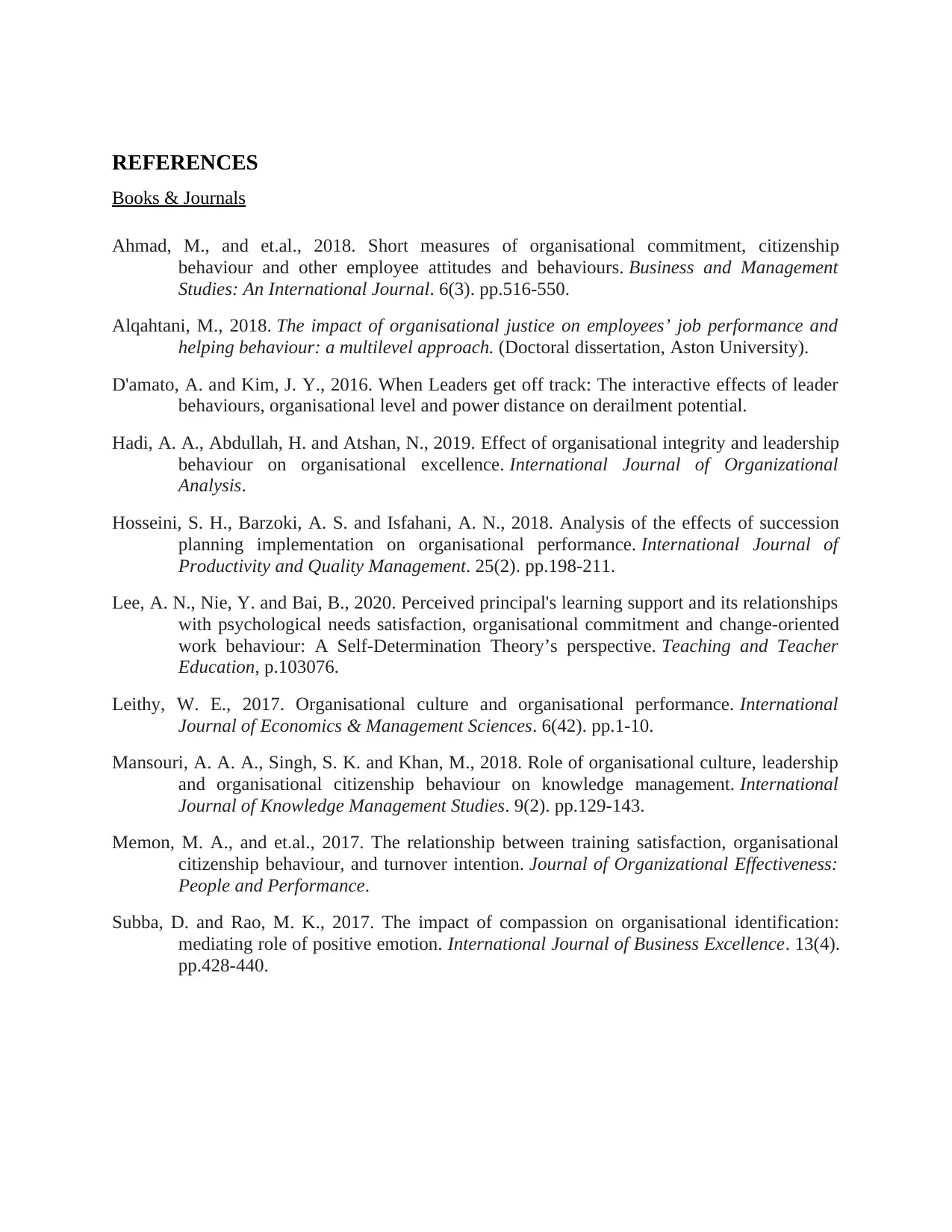
REFERENCES
Books & Journals
Ahmad, M., and et.al., 2018. Short measures of organisational commitment, citizenship
behaviour and other employee attitudes and behaviours. Business and Management
Studies: An International Journal. 6(3). pp.516-550.
Alqahtani, M., 2018. The impact of organisational justice on employees’ job performance and
helping behaviour: a multilevel approach. (Doctoral dissertation, Aston University).
D'amato, A. and Kim, J. Y., 2016. When Leaders get off track: The interactive effects of leader
behaviours, organisational level and power distance on derailment potential.
Hadi, A. A., Abdullah, H. and Atshan, N., 2019. Effect of organisational integrity and leadership
behaviour on organisational excellence. International Journal of Organizational
Analysis.
Hosseini, S. H., Barzoki, A. S. and Isfahani, A. N., 2018. Analysis of the effects of succession
planning implementation on organisational performance. International Journal of
Productivity and Quality Management. 25(2). pp.198-211.
Lee, A. N., Nie, Y. and Bai, B., 2020. Perceived principal's learning support and its relationships
with psychological needs satisfaction, organisational commitment and change-oriented
work behaviour: A Self-Determination Theory’s perspective. Teaching and Teacher
Education, p.103076.
Leithy, W. E., 2017. Organisational culture and organisational performance. International
Journal of Economics & Management Sciences. 6(42). pp.1-10.
Mansouri, A. A. A., Singh, S. K. and Khan, M., 2018. Role of organisational culture, leadership
and organisational citizenship behaviour on knowledge management. International
Journal of Knowledge Management Studies. 9(2). pp.129-143.
Memon, M. A., and et.al., 2017. The relationship between training satisfaction, organisational
citizenship behaviour, and turnover intention. Journal of Organizational Effectiveness:
People and Performance.
Subba, D. and Rao, M. K., 2017. The impact of compassion on organisational identification:
mediating role of positive emotion. International Journal of Business Excellence. 13(4).
pp.428-440.
Books & Journals
Ahmad, M., and et.al., 2018. Short measures of organisational commitment, citizenship
behaviour and other employee attitudes and behaviours. Business and Management
Studies: An International Journal. 6(3). pp.516-550.
Alqahtani, M., 2018. The impact of organisational justice on employees’ job performance and
helping behaviour: a multilevel approach. (Doctoral dissertation, Aston University).
D'amato, A. and Kim, J. Y., 2016. When Leaders get off track: The interactive effects of leader
behaviours, organisational level and power distance on derailment potential.
Hadi, A. A., Abdullah, H. and Atshan, N., 2019. Effect of organisational integrity and leadership
behaviour on organisational excellence. International Journal of Organizational
Analysis.
Hosseini, S. H., Barzoki, A. S. and Isfahani, A. N., 2018. Analysis of the effects of succession
planning implementation on organisational performance. International Journal of
Productivity and Quality Management. 25(2). pp.198-211.
Lee, A. N., Nie, Y. and Bai, B., 2020. Perceived principal's learning support and its relationships
with psychological needs satisfaction, organisational commitment and change-oriented
work behaviour: A Self-Determination Theory’s perspective. Teaching and Teacher
Education, p.103076.
Leithy, W. E., 2017. Organisational culture and organisational performance. International
Journal of Economics & Management Sciences. 6(42). pp.1-10.
Mansouri, A. A. A., Singh, S. K. and Khan, M., 2018. Role of organisational culture, leadership
and organisational citizenship behaviour on knowledge management. International
Journal of Knowledge Management Studies. 9(2). pp.129-143.
Memon, M. A., and et.al., 2017. The relationship between training satisfaction, organisational
citizenship behaviour, and turnover intention. Journal of Organizational Effectiveness:
People and Performance.
Subba, D. and Rao, M. K., 2017. The impact of compassion on organisational identification:
mediating role of positive emotion. International Journal of Business Excellence. 13(4).
pp.428-440.
⊘ This is a preview!⊘
Do you want full access?
Subscribe today to unlock all pages.

Trusted by 1+ million students worldwide
1 out of 9
Related Documents
Your All-in-One AI-Powered Toolkit for Academic Success.
+13062052269
info@desklib.com
Available 24*7 on WhatsApp / Email
![[object Object]](/_next/static/media/star-bottom.7253800d.svg)
Unlock your academic potential
Copyright © 2020–2026 A2Z Services. All Rights Reserved. Developed and managed by ZUCOL.





